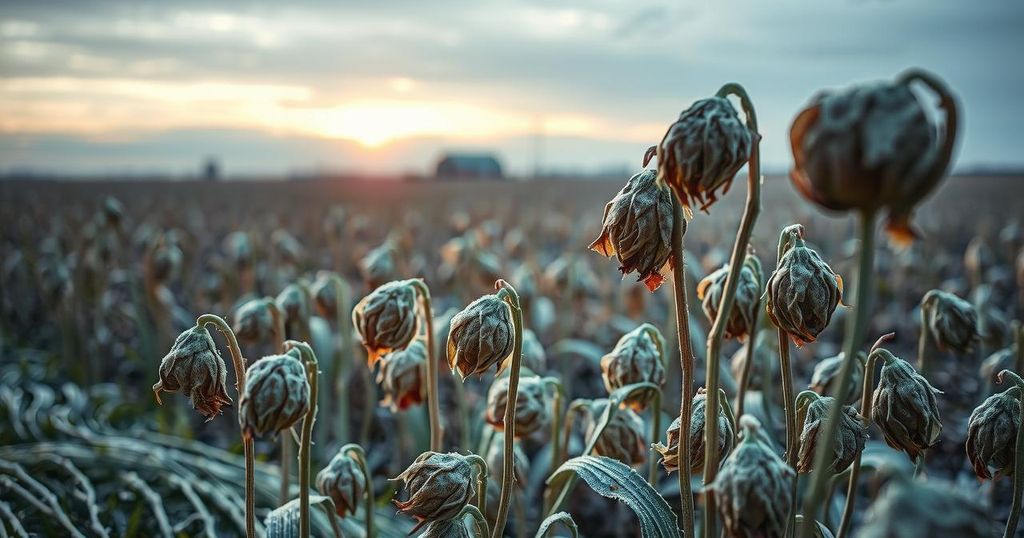Climate change is severely affecting winter crop farming in Rajshahi, posing threats to food security and farmer livelihoods. Changes in winter duration and intensity have led to significant agricultural impacts. Urgent measures are required to enhance food production and safeguard farmers’ rights, while developed nations are called to meet climate financing commitments.
The consequences of climate change are increasingly jeopardizing winter crop farming in Rajshahi, particularly impacting legumes and vegetables. Winters have seen significant changes in duration and intensity in recent years, adversely affecting agricultural yields. Immediate interventions are crucial to enhance food security amidst the challenges presented by climate change.
Farmers like Abdur Rahim from Bargachhi village have noted the detrimental effects of climate change on the diversity of winter vegetable farming. He advocated for developed nations to uphold their climate funding commitments and improve transparency concerning these funds. Furthermore, protecting farmers’ rights is essential to motivate them to meet the growing agricultural demands effectively.
Shahidul Islam, a regional coordinator of BARCIK, highlighted that climate change is posing severe risks to the existing agricultural framework, leading to various natural disasters. He expressed concern over the alarming impact on water resources and agriculture in regions including Barind, which is particularly sensitive to these changes.
Research conducted by Professor Chowdhury Sarwar Jahan from Rajshahi University indicates that maximum temperatures favor certain crops like Aus and Aman but negatively impact others such as Boro and wheat. The study also noted a decrease in cropland area for rice, sugarcane, and maize, while there is an increase in potato, wheat, and pulses.
The Vice-Chancellor of Varendra University, Professor Osman Gani Talukder, called for actions to mitigate climate change impacts to safeguard the livelihoods of residents in the region. He stated that severe climate change affects all sectors of agriculture, making it a significant threat to food production.
Professor Laila Arzuman Banu from Rajshahi University discussed the repercussions of drought, emphasizing dust storms, eroded landscapes, and insufficient irrigation as significant concerns. Currently, over 16,000 deep tube wells are utilized to extract groundwater necessary for irrigation, particularly for rice cultivation to support the growing population.
The article addresses the pressing issue of climate change and its relationship with agricultural practices in Rajshahi, Bangladesh. It emphasizes how alterations in weather patterns and extreme natural disasters threaten winter crop farming, impacting both crop yield and farmers’ livelihoods. The necessity for immediate intervention and climate adaptation measures is explored, alongside the obligation of developed countries to support climate-resilient agricultural practices through funding and policy changes.
In conclusion, climate change presents a severe challenge to winter crop farming in Rajshahi, impacting food security and the livelihoods of farmers. Urgent actions are needed to bolster agricultural production and protect farmers’ rights. Furthermore, collaboration among stakeholders and international support is vital in addressing these environmental challenges and ensuring sustainable agricultural practices in the region.
Original Source: www.bssnews.net




